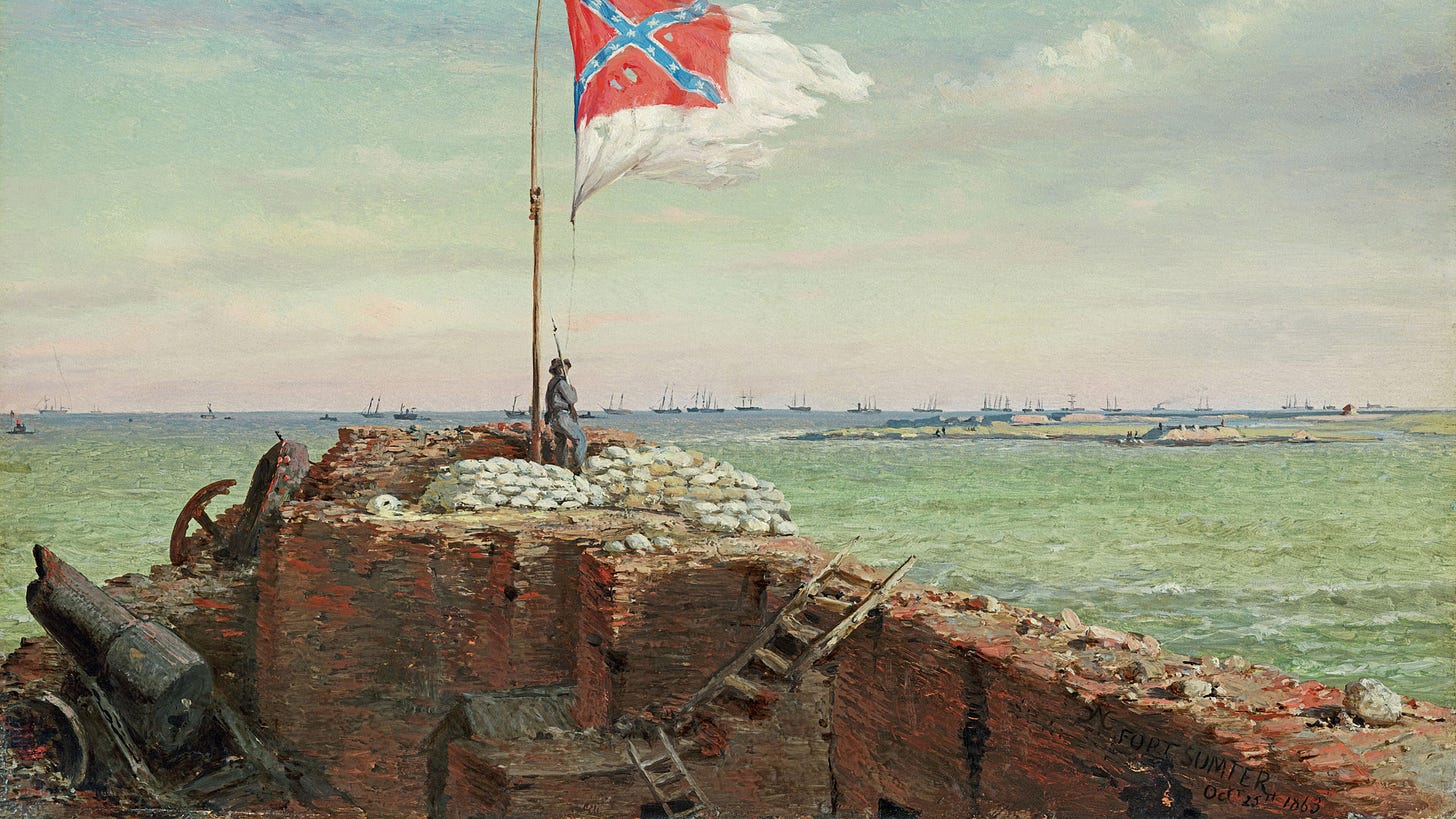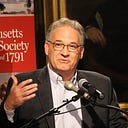From 'Diehard Rebel' to Republican Scalawag
An introduction to the correspondence of John Christopher Winsmith
Now that I’ve sent off the first draft of my biography of Robert Gould Shaw to the publisher, I can get back to work editing the wartime and postwar correspondence of John Christopher Winsmith of Spartanburg, South Carolina. The book is tentatively titled: From Diehard Rebel to Republican Scalawag: The Letters of John Christoper Winsmith, 1859-1877. It is one of the most remarkable collections of letters that I have read through and I am excited to make it available to a wider readership.
All of his correspondence has been transcribed and divided into twelve chapters. I am now in the process of annotating and writing short introductions for each chapter as well as a more comprehensive introduction. I hope to have this project sent off to the publisher by the end of the year. Here is an overview of the project for those of you who are interested.
John Christopher Winsmith (referred to as Christopher by family and friends) was in route from his home in Spartanburg District to Charleston, South Carolina when news arrived of the surrender of Fort Sumter to Confederate forces under the command of General P.G.T. Beauregard. For Christopher there was never any question he would fight for an independent Confederacy. Born in 1837, he came of age during the height of the sectional conflict of the 1850s. He followed political events related to the growing sectional divide over slavery closely in the newspapers and in correspondence with his father.
Few families in Spartanburg District were more excited about the prospects of an independent Confederacy than John Winsmith and his son, John Christopher. Winsmith was one of the wealthiest slaveholders in the area and an early advocate for disunion. In 1851 he upheld the right of a state to secede as a means to “shield her citizens against the unholy crusade which has been waged upon their vital institution” of slavery. A state representative in 1860, Winsmith offered the first resolution in the General Assembly calling for secession just days after Abraham Lincoln was elected president. His election, Winsmith charged, was “based upon principles of an open and avowed hostility to the social organization and peculiar interests of the slaveholding states of this Confederacy.”
Christopher was an unwavering Confederate nationalist, who maintained it was “the duty of the whole South to make common cause against the hordes of abolitionists who are swarming Southwards.” He served briefly as a lieutenant in the 5th Regiment, South Carolina Volunteers. After being voted out he remained in the unit as a private before accepting the rank of captain in the 1st South Carolina Infantry in 1862. Failure to secure a higher rank proved to be incredibly frustrating, but Christopher never wavered in his commitment to the cause.
In the army Christopher witnessed or took part in some of the bloodiest battles of the war, including Second Manassas, Antietam, Fredericksburg, Chickamauga, as well as the Overland Campaign and the first four months of the Petersburg Campaign.
Even after the point where many Confederates acknowledged the likelihood of defeat, Christopher maintained a stoic faith in independence. Accompanied by at least five body servants or camp slaves throughout the war (though one ran off in 1862), Christopher was convinced that the South’s enslaved population would remain loyal. Captain Winsmith supported harsh disciplinary measures, including, the execution of deserters late in the war. Christopher relied on his father to help with the maintenance of discipline in his company. John Winsmith assisted his son by inquiring into the whereabouts of locals who were reported to have deserted and then took steps to have them returned to the unit and the possibility of military charges.
Christopher’s mother and sister expressed their support for his efforts with regular shipments of food and other supplies that were always welcome and often desperately needed. That support helped to sustain Christopher through numerous hardships experienced during the war. Had he not been seriously wounded on September 30, 1864 at the battle of Fort Harrison—a battle in which he was exposed for the first time to Black Union soldiers—Christopher would have begrudgingly surrendered with the rest of Robert E. Lee’s army at Appomattox Court House on April 9, 1865.
By the turn of the century, wartime records like Christopher Winsmith’s were celebrated at monument dedications across the South. His record of bravery and devotion to the Confederacy was undeniable and fit the foundation of the Lost Cause—the belief that the Confederate cause was just and that the institution of slavery was moral—that took shape in the immediate aftermath of defeat and emancipation. But it is an incomplete history of this Confederate stalwart. Within five years of war’s end both Winsmiths had joined the Republican Party.
While it is not entirely clear why, what is clear is that their joining the “Party of Lincoln” and supporting Black civil rights was considered a betrayal of the Confederate cause by many of their peers. That was brought home to John Winsmith on March 22, 1871, when the Ku Klux Klan confronted him on his back porch in the middle of the night. The assault, in which he suffered seven gunshot wounds, may have been in response to his offer of Saturdays and Sundays off to his Black tenants and his determination to establish a school on his property for the education of former slaves.
Christopher’s postwar path was no less fraught. During his tenure as a major general in the state militia, Christopher used his military authority to protect Black tenants residing on his father’s plantation home by placing guards around the perimeter. In court he argued that debts involving formerly enslaved individuals could no longer be collected. He subsequently paid for the publication of his closing argument in pamphlet form, which suggests his loyalty to the Republican Party was well known.
As racial violence increased across South Carolina in the 1870s, Christopher appealed to President Ulysses S. Grant for more military intervention in response to vigilante groups such as the Red Shirts, who terrorized Blacks who joined the Republican Party or attempted to exercise their civil rights. In a speech delivered to a gathering of Black and white Republicans in his home town on the eve of elections in 1876, Christopher denounced the cause of the Confederacy and called on Americans to continue the work “to establish upon a basis which can never be shaken freedom and equal rights for all men.”
The path taken by Christopher threatened claims made by Lost Cause apologists that white southerners stood unified during and after the war in their defense of the Confederacy, and in their opposition to military occupation during Reconstruction and Black political action. Captain Winsmith’s wartime record may have given succor to white southerners as they faced their many postwar challenges, but a more accurate accounting of his military and political record during Reconstruction would have undermined the broader goal of maintaining, by whatever means, the racial status quo.
Significance of the Letters and Postwar Correspondence/Speeches
The content of Christopher’s wartime letters alone warrants publication, but the inclusion of a selection of his postwar correspondence and speeches will set it apart from most published wartime accounts. Focusing on Christopher’s wartime and postwar correspondence not only complicates our understanding of Southern white Republicans, but Confederate identity as well. Many of the most ardent Confederates like Christopher, who held out to the last, struggled with adjusting to a postwar environment defined by defeat and emancipation. Many viewed their mobilization against Republican rule as an extension of their wartime service. Christopher’s relatively quick acceptance and support of a bi-racial government as well as his eventual denunciation of the Confederacy speaks to the impact that the experience of war and Reconstruction had on Southern white identity.
Understanding both necessitates casting the Civil War and Reconstruction in South Carolina as part of one continuous struggle. All too often the war and postwar periods are understood as discrete events as opposed to a continuous battle over home rule and the place of formerly enslaved Blacks in a reunited nation. White South Carolinians fought for over four years to preserve the institution of slavery and the racial status quo. Confederate defeat signaled the end of organized fighting, the restoration of the Union, and the end of slavery and the emancipation of roughly 4 million people.
The end of formal military operations in South Carolina in 1865, however, quickly gave way to extra-legal efforts to stem the tide of emancipation and the emergence of Black political power. Confederates who laid down their arms at Appomattox soon picked them up again in local Klan chapters and militia units and fought against Black and white South Carolinians to reestablish white supremacy.
Christopher lived through an intense period of violence between 1861 and 1877 that included two civil wars, first as a Confederate soldier fighting against the United States and later as an officer in the state militia defending the duly elected Republican state government. Looking at this extended period through the story of one person also serves as a reminder that the end of Reconstruction and the rise of Jim Crow was not inevitable. However unlikely Christopher and his father’s shift in political allegiance may have been, it opened up a possible future that many Black and white South Carolinians believed was attainable and worth fighting for. Understanding why they failed offers lessons for those who continue the campaign for racial justice and civil rights in the United States.







This sounds at least as interesting as the bio of Shaw, if not more. Very much looking forward to it!
I am really looking forward to this book! Are there any hints about the reasons for their change in political views?